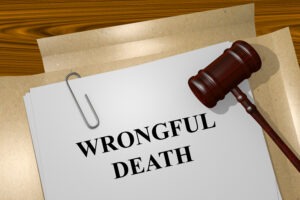
CALL (800) 863-5312 TO SPEAK WITH A WRONGFUL DEATH LAWYER FOR FREE

John (Jack) Zinda
Founder / CEO
Over 100 years of combined experience representing injured victims across the country.
Available 24 / 7|Free ConsultationWhat is a “Wrongful Death” Lawsuit?
Before learning what is necessary to prove wrongful death, it is helpful to understand what a “wrongful death” lawsuit is. Because individual states have slightly different laws which set the guidelines and boundaries of wrongful death claims, it is difficult to provide a one-size-fits-all description of a wrongful death claim. However, the primary components of a wrongful death are very similar throughout the country.
A wrongful death lawsuit is a type of civil action brought by a family member or representative of the deceased individual against another person or entity who can be held liable for the death. Most states define wrongful death as a death that is caused by the “wrongful act, neglect or default” of another. Thus, grounds for a wrongful death claim exist when a family member dies due to the legal fault of another person or entity. If successful, a wrongful death lawsuit can provide financial compensation in the form of damages to the party who filed the suit.
One common misconception about wrongful death is that a wrongful death claim can only be brought by prosecutors. A similar misconception is that once a person is criminally charged, a wrongful death lawsuit may no longer be pursued. Although it is true that the facts and circumstances of a case may induce law enforcement and prosecutors to pursue criminal charges against the alleged at-fault party, it is important to remember that a pending criminal case does not necessarily prevent a civil wrongful death action from being filed in civil court. However, because the interaction of criminal and civil cases arising from the same set of facts may pose difficult legal issues, you should consider discussing your options with a wrongful death attorney before taking legal action.
If you have lost a loved one and are considering filing a claim, call (800) 863-5312 to speak with one of the knowledgeable wrongful death attorneys at Zinda Law Group for a free consultation.

Neil Solomon
Partner
Real results matter. We do not get paid unless we win your case.
Available 24 / 7|Free ConsultationProving Wrongful Death
In most wrongful death cases, the wrongful death claim is settled outside of a courtroom. This is because the attorneys for both parties work to reach a settlement agreement that is satisfactory to both sides. However, when a wrongful death claim does reach the trial stage, the plaintiff must prove that a wrongful death occurred in order to receive compensation. This requires the plaintiff to establish the elements of a wrongful death and prove that each element was met. Those elements include:
- Duty of care
- Breach of the duty of care
- Causation of death
- Damages

Elecia Byrd
Attorney
Standing by 24 hours a day, 7 days a week ready to answer in your time of need.
Available 24 / 7|Free ConsultationDuty of Care
The first part of proving a wrongful death is establishing that the defendant owed a duty of care to the deceased person. Although the exact definition of “duty of care” depends on the circumstances and relationship between the two parties, a duty of care typically refers to a duty to keep someone safe or to refrain from engaging in an activity that could potentially cause someone harm.
Consider some examples of common wrongful death scenarios. In the case of a car accident, the plaintiff will have to show that the defendant had a duty to act as a reasonably prudent person would by obeying traffic laws and driving carefully. Another example would be an employee who died while on the job. In this type of case, the plaintiff will have to establish that the company or individual supervisor had an obligation to provide adequate safety precautions for the employees. Yet another example is medical malpractice. In these cases, the plaintiff must show that the medical staff have a duty to provide patients with safe and comprehensive care.

Cole Gumm
Attorney
We are here to ensure you won’t have to face this difficult time alone.
Available 24 / 7|Free ConsultationBreach of Duty of Care
The second part of proving a wrongful death is establishing that the defendant breached the applicable duty of care owed to the deceased individual.
Using the same examples outlined above, we can see how this element of a wrongful death claim can be established. In the case of a car accident, the plaintiff can establish a breach of duty by proving that the defendant failed to obey traffic laws (e.g., speeding, running a red light, driving through a stop sign, etc.) In the case of a work-related death, the plaintiff can establish a breach of duty by showing that the employer or supervisor failed to provide the deceased employee with proper safety equipment or failed to properly train the deceased employee. In medical malpractice cases, the plaintiff can prove a breach of duty by showing that the medical staff strayed from the proper medical treatment within a community.
Proving this element typically requires evidence such as witness statements, expert testimony. surveillance footage, and formal documents (e.g., police reports, work logs, safety guidelines, medical records, etc.). Such evidence can be collected by an attorney throughout the discovery phase of litigation and will serve as a crucial component of your wrongful death claim.
Causation of Death
The third part of proving a wrongful death is establishing a link between the defendant’s breach of duty and the death of the deceased individual. In other words, the plaintiff must prove that the defendant’s action or inaction directly caused the death of the individual.
Damages
Generally, proving damages means proving that the injured party suffered some type of harm, either physically or financially. In cases of wrongful death, if the elements of duty, breach, and causation are established, damages will be presumed.
The “Burden of Proof”
A “burden of proof” is a common legal term that many people have heard of but do not understand. The term refers to the obligation of a party to produce evidence that will support the claims made against the other party.
In wrongful death cases, the standard for burden of proof is a “preponderance of the evidence.” What this means is that the plaintiff must prove that the defendant’s action or inaction “more likely than not” caused the death of the deceased individual. This standard is contrasted with “beyond a reasonable doubt,” which is the stricter standard required to convict a defendant in a criminal trial.
Determining fault in a wrongful death case involves establishing the four elements listed above. Effectively establishing these elements will require you and your attorney to thoroughly comb through the facts of your case. As mentioned above, this likely means interviewing witnesses, analyzing accident reports, autopsy reports, and medical records, and consulting with experts. Each of these measures will likely be necessary in order to prove that another party is liable for wrongful death.
Statute of Limitations
It is critical to keep in mind that states set a time limit, called a “statute of limitations,” on which a person can file a wrongful death claim. This means that a wrongful death claim must be filed within a certain time before the claim is effectively barred from being tried in court of law.
States vary with respect to their applicable statute of limitations for wrongful death cases. However, most state legislatures have enacted a two- or three-year statute of limitations. This means that, depending on the state, a lawsuit must be filed within two or three years from the date of the misconduct that caused the death of the decedent. For example, if a person was killed in a car crash on December 1, 2018, a wrongful death suit must be filed before December 1, 2020 (or December 1, 2021 if the state has a three-year statute of limitations) before the claim is barred from being litigated in court.
In certain cases, the statute of limitations may be as short as one year. The issue is further complicated by special exceptions for cases involving minors or individuals with mental disabilities. Finally, a statute of limitations may be paused or “tolled.” In these cases, the statute of limitations clock does not begin ticking until the harm is discovered.
Because the statute of limitations is a crucial factor in wrongful death cases, it is worth considering seeking the advice of an experienced wrongful death attorney, especially if you think the statute of limitations is nearing. An attorney will be able to provide you with legal advice regarding the status and viability of your claim.
Filing a Wrongful Death Lawsuit
If you wish to file a wrongful death lawsuit, it is first necessary that you are authorized by your state’s wrongful death statute to file such a suit. In some states, the decedent’s surviving spouse, children, siblings, or parents are authorized to file a wrongful death claim. Other states may only authorize the personal representative or executor of the decedent’s estate to file a wrongful death claim.
If you are authorized to file a wrongful death claim, your first step should be to contact a wrongful death attorney. A wrongful death attorney will meet with you to review and discuss the important facts of your case.
After the initial meeting, the wrongful death attorney will conduct a thorough investigation. Part of this process will require the attorney to interview several parties, including the person who caused the accident, witnesses to the accident, and insurance companies who cover the accused party.
After gathering key information, the attorney will contact you to review your legal options. If you have a good case, a lawsuit may be filed. This process begins by filing the necessary documents, which puts the court and the defendant on notice that a lawsuit is being initiated.
The remainder of the process consists of more investigation into the facts of the case. Investigations and depositions may be conducted up until the time of trial, unless the parties reach a settlement.
GET HELP FROM EXPERIENCED WRONGFUL DEATH LAWYERS
At Zinda Law Group, our wrongful death attorneys have helped many families find justice and fair compensation after the death of a loved one. Our attorneys have the knowledge and experience to help you through this difficult time. As our client, you do not owe us anything unless we win your case.
Call Zinda Law Group today at (800) 863-5312 for free consultation with one of our Denver wrongful death lawyers. Meetings with attorneys by appointment only.

Jason Aldridge
Attorney
We have successfully represented clients in a wide variety of cases across the country.
Available 24 / 7|Free Consultation










